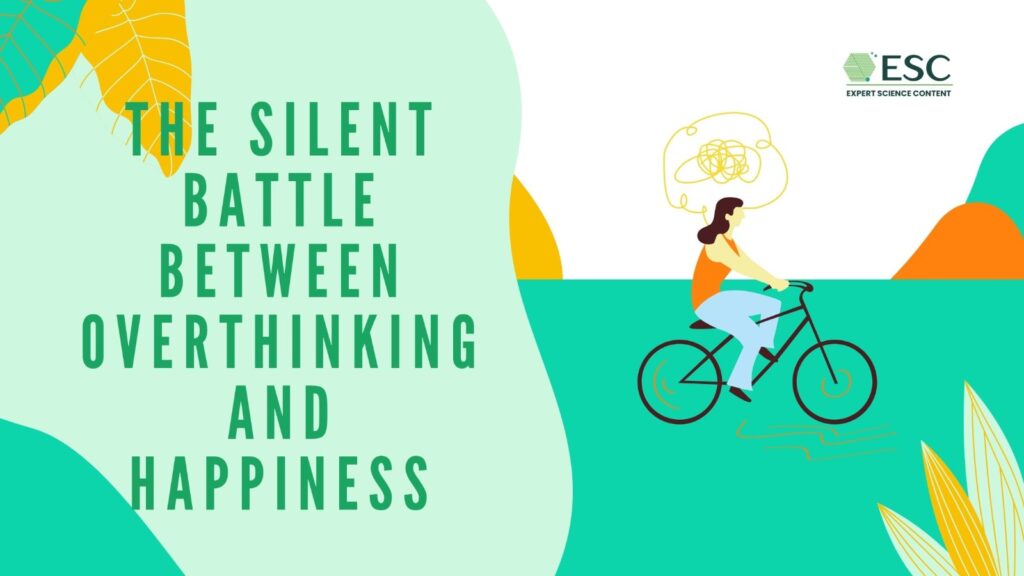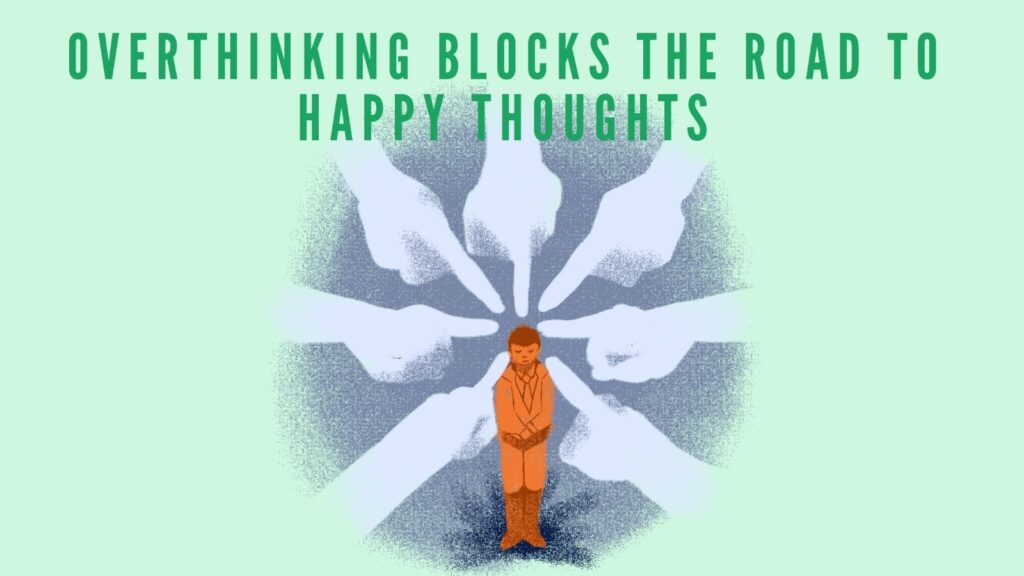The Silent Battle Between Overthinking and Happiness
- Published By: Dr. Anindita Talukdar
- Published On: August 22, 2025
- 6 Minutes to read

Overthinking is a silent happiness killer, referring dwelling on particular thoughts related to a situation or the possible outcome of it. Overthinking can never be a healthy solution for your problem, but it might be a way to avoid your real feelings.
Overthinking: The power of Mind
Hello, reader! Have you ever caught yourself in a situation where you were worrying about what to wear or rehearsing conversations in your head before a get-together? Instead of enjoying that very moment, you are thinking, analyzing, doubting yourself, that’s overthinking!
After a busy day, somehow you managed to have quiet moments to yourself just to breathe. Yet, before you know it, your mind starts racing: Did I forget to send that email? Am I really good enough for that promotion? Did I mention to my boss how excited I am about my promotion? What if I said the wrong thing during our conversation with that client?
Sound familiar?
If yes, you’re not alone. Overthinking is a deeply human experience, we engage in it far more often than even we realize. Reflection and awareness are healthy and important but chronic overthinking can slowly chip away at one essential part of our life: happiness. As the title says there is a silent battle between these two and overthinking and happiness can not go hand in hand.
In this blog you are going to explore why overthinking and happiness rarely coexist, how and why it affects your mental health, and what practical steps you should take to overcome overthinking and shift toward a lighter, more joyful life.
Your Energy Flows Where Your Mind Goes
Let’s be real— minds are powerful and if we don’t direct them towards good thoughts, that power gets misdirected. Overthinking is like similar negative thoughts fueled by anxiety, keep spinning into what psychologists call rumination.
Your mind is constantly running through the same thoughts (mostly negative), conversations, or decisions, but you are not getting anywhere. And the whole process isn’t just annoying—it’s draining. The more you ruminate, the more anxious, sad, indecisive, and overwhelmed you feel. As per research studies overthinking is related to higher stress levels, anxiety, and leading to depression.
So, if you’re here and asking yourself, “How do I stop overthinking?”—you’re already one step ahead to choose happiness.

Overthinking Blocks the Road to Happy Thoughts
Happiness thrives in presence. When you’re enjoying an evening walk with your partner, laughing with a friend, or savoring your morning breakfast with your child, you enjoy that very moment.
But overthinking hijacks the peace and happiness of that moment. It takes you away from reality and puts you into an imaginary world of “what-ifs,” past regrets, future worries and countless destructions.
According to the book “The Happiness Hypothesis” written by Jonathan Haidt, happiness isn’t external—it often stems from within, shaped by our day to day thoughts, emotions and happiness. When we are too much into analysing and judging, we are far from the joy of living fully in the present.
How the Way You Think Shapes the Way You Feel
Your energy flows where your mind goes and a calm mind always creates beautiful memories for life.
When your mind is full of doubts, fear, and worry, your emotions will likely follow your mind. You must have noticed how one spiraling thought can ruin your entire mood? That’s the cycle of rumination in action.
So dear reader, next time you catch yourself stuck in such a situation, stop, pause, look into your surroundings and ask yourself:
- How am I feeling? How does this thought make me feel?
- Does this thought hurting me, making me anxious or helping me?
- Is there any kinder, more helpful thought I could focus on instead?
Self-awareness is important, it’s not just about mental hygiene—it’s emotional liberation. And to all the ladies out there, remember: you can not control everything to be at peace. Sometimes, things get messy—and that’s okay.
Let It Go: Choosing Happiness Over Overthinking
Happiness is like an open window, it invites in light, fresh air, and it shows clarity. Think of overthinking as pulling the blinds shut, it covers the window from the light, fresh air and it layers with dust and doubt.
Overthinking darkens your emotional being without you even realizing it. Many of us, including different age groups falsely believe that overthinking leads to better outcomes. Often we misinterpret overthinking with self-awareness. We think by analyzing every point, we would come up with better and smarter choices or protect ourselves from failure.
However the reality of happiness is:
- The happiest people aren’t the ones who think more.
- Happiest people are the ones who know when to let go.
The Power of Habitual Acceptance
One of the most effective tools in our fast paced life is habitual acceptance—the practice of noticing and accepting reality and your emotions as it is without judging and trying to resist them.
The helpful characteristics of mindful acceptance is research backed. Research shows that people who practice mindfulness, embrace imperfection and people who habitually accept their internal experiences have greater psychological health and less emotional vulnerability when facing life’s inevitable stressors.
When you reframe your negative thoughts and learn to say, “Oh, I’m feeling anxious right now,” or “That’s a fearful thought,” without shaming yourself for such thoughts, you start to break the cycle.
The benefits of habitual acceptance:
- Reduce stress and anxiety
- Promotes personal growth
- Improve mental health
- Enhance relationships
This is not about forcing happy thoughts but allowing space for all thoughts without letting them define you.
Small Steps To Encourage Happy Thoughts
Let’s explore some small steps to feel happier, feel real and embrace your well being in the following section.
Focus on Self-Compassion, Not Perfectionism
Overthinking often comes from the belief that you have to get it right, be the best, or avoid mistakes at all costs. But what we don’t accept is that perfectionism is a happy thought killer.
Instead of holding and controlling yourself to impossible standards, try practicing self-compassion. This doesn’t mean lowering your bar, instead it means recognizing you’re human, you can make mistakes. You should realize that messing up, feeling scared, feeling sad, or doubting yourself is normal and human.
Next time practice saying the following to yourself when you feel anxious:
- “It’s okay to not have all the answers.”
- “I’m doing the best I can with what I know.”
- “May I accept myself exactly as I am.”
Be patient and kind to yourself before everything and self-kindness rewires your internal dialogue. And happy thought begins with a more forgiving inner voice.
Recognizing the ANTs: Automatic Negative Thoughts
As a research scientist and someone who personally struggled with overthinking for a year, I want to make it easier for anyone experiencing the same. It is important to recognize and manage ANTs (Automatic Negative Thoughts) for individuals mental well being. These are common psychological phenomena, spontaneous, often pessimistic or defeatist, and can impact mood and perception. If you have ever found yourself spiraling with similar thoughts, self-doubt or assuming the worst in a situation, you’ve met the ANTs.
The little mental intruders hardwired into us from past experiences, conditioning, and fear need to change, such as statements like:
- “I’m going to fail.”
- “I’ll never be good enough.”
- “Everyone ignoring me.”
- “Everyone is judging me.”
Need to change with thought like:
- What is the situation that triggered me?
- The exact thought that popped up?
- The emotion I felt?
- What will be a healthier, more compassionate alternative thought?
Start keeping a “thought log” where you write down all your emotional outburst. This process, inspired by cognitive behavioral therapy (CBT), helps train your brain to shift from default negative thought to mindfulness.
Making the Mental Shift: One step a day
Changing how you think is like switching gears in your mind. You can learn to interrupt the overthinking pattern and shift your focus.
This doesn’t mean denying your thoughts. It means choosing which ones you give your attention to.
This is where practices like mindfulness, journaling, or simply pausing to breathe come in. Each time you bring your awareness back to the present moment, you take one step away from the chaos of your mind—and one step closer to happiness.
As the book The Courage to Be Disliked beautifully explains, freedom and happiness come not from being liked or perfect, but from living true to your values, regardless of what others think.
One pro tip: To all the moms/dads/educators out there please teach your children/students to love who they are and let them be their totally awesome, goofy selves. That’s honestly the best gift you can give.
Embrace the Fear—Don’t Fight It
Some fears will never go away—and that’s okay. Trying to silence every uncomfortable thought can be like playing mental whack-a-mole. Instead, allow the fear to be there. Acknowledge it, breathe with it, and move forward with it.
A scientific study from 2018 shows that accepting negative thoughts and emotions—rather than avoiding or fighting them—can actually improve your mental health over time. By embracing uncertainty, you stop giving it power over your peace.
You Don’t Have to Do It Alone
If overthinking is severely impacting your daily life, don’t think you’re weak—you are human. And that’s fine to feel that way. Many of us do!
Talking to a trusted friend, a close sibling, a therapist, or a mental health coach can help you gain clarity and develop tools to manage your thoughts more effectively. There’s strength in reaching out.
Towards Happy Thoughts
Don’t pressure yourself to “just be happy” or “think positive.” Real happiness isn’t about toxic positivity—it’s about emotional honesty and gradual shifts.
Some days, the best thing you can do is acknowledge the thought and say: “I see you. But I’m not going there today.” Other days, it might be simply taking a walk, breathing deeply, or writing down one thing you’re grateful for.
Over time, these small choices reprogram your mental patterns—and eventually, overthinking loosens its grip.
Final Thoughts: Choose Presence Over Perfection
The silent battle between overthinking and happiness doesn’t have a one-time solution—it’s a daily decision. It’s a choice to step out of the mental maze and into the present. In this current messy world many of us are suffering silently with this battle and it is totally fine to accept and start working on it to bring back our happiness.
It’s a commitment to self-awareness, to acceptance, to kinder thoughts. So the next time your mind spins into overdrive, pause and remember this:
You are not your thoughts. You are the awareness behind them. And in that awareness, happiness patiently waits.
To learn more about self awareness, science and scientific awareness, read our blog section.

Dr. Anindita Talukdar
The creative behind ESC sharing smart actionable tips and insights to level up writing and research skill.
Join ESC
Get our newsletter

Dr. Anindita Talukdar
The creative behind ESC sharing smart actionable tips and insights to level up writing and research skill.

I do believe all the ideas you have presented for your post They are really convincing and will certainly work. May just you please lengthen them a little from subsequent time. Thanks for the post
Thank you for your valuable feedback, glad you like my blogs. Surely I will try to explain and elaborate more. Stay tune for more such posts.